It can be frustrating for those who want to conceive and cannot, especially when they try to be more mindful of their health and lifestyle choices. We wanted to know everything about fertility so we chatted with our fertility expert Naturopathic Doctor, Dr. Holly Johnston. Not only is Dr. Holly a Naturopath, but she’s also specialized in bioidentical hormone prescribing, integrative fertility, herbal medicine for women, and naturopathic doula services – basically the perfect fit for this topic!
We chatted with Dr. Holly about the most common factors that make conception difficult, top foods for fertility and why men (and women) may want to try a detox before trying to conceive.
 WEHL: Tell us a little about yourself and why you became interested in holistic wellness.
WEHL: Tell us a little about yourself and why you became interested in holistic wellness.
HJ: As a child I was an adventurer and wanderer. I spent a great amount of time at my grandparents’ farm in the summer months exploring the wooded areas and helping out with the harvest. My plant friends, blue skies, and sunshine made me the happiest, and you could often find me in the fields “wild-crafting” with various plants and flowers.
Naturally, I was always curious about plant and human biology, which led me to pursue a Bachelor of Science in Biomedical and Nutritional Sciences at the University of Guelph. At this point I thought I was destined for a career in western medicine. In my fourth year of University, I was led into the realm of functional medicine, mostly out of curiosity to resolve my own health issues. It was here that something shifted within me. I had been working in a research lab on a project that was looking at the relationship between genetics and fatty acid (omega 3 & 6) metabolism, and this is the first time that I was introduced to the concept of individualized medicine, which is something that really resonated with me.
Intuitively I felt the pull to work with people to inspire and educate them about their health in a different way than the traditional medical model. I wanted to connect with people, hear their personal stories, and guide them on a path that wasn’t just free of “xyz” symptoms but how they could optimize their health and wellness. I wanted to help people feel alive, whole, radiant, happy, in balance, and connected – with themselves, and with others.
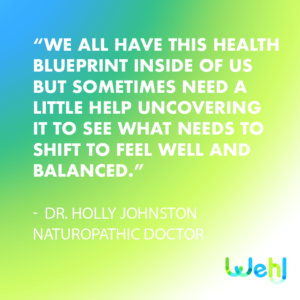
WEHL: What is your philosophy on wellness?
HJ: Naturopathic medicine is all about wellness, and aligning with our authentic selves. We all have this health blueprint inside of us but sometimes need a little help uncovering it to see what needs to shift to feel well and balanced.
What makes NDs different from other healthcare practitioners is that we assess the body as a whole, or holistically, meaning we look at how all the organ systems are communicating with each other to determine the root cause of symptoms. Often we can have many seemingly unrelated concerns, but they may all be coming from the same organ or gland imbalance.
Once we have an idea of what the root cause may be, there are so many wonderful modalities we can use to get the body back into balance.
First, we remove any disruptors to health such as food sensitivities, toxins, inflammation or stress. Then, we look at how we can incorporate a healthier regimen and correct any nutrient deficiencies. From there, we address the organ pathology or imbalance, with clinical nutrition, herbs, and/or acupuncture. Really, my job is just to facilitate wellness; it’s up the individual to drive & commit to their health goals. It’s such a beautiful thing that our bodies are capable of healing themselves with a little help from nature.
WEHL: Why did you decide to become a Naturopathic Doctor with an interest in fertility?
HJ: In my last year of Naturopathic Medical School, I became trained as a Naturopathic Doula. The joy that comes with welcoming a new babe into the world & seeing the transition of couples into parents has been a pretty amazing experience.
Working with fertility excites me because it truly is what naturopathic medicine is all about – being at your best health! I love being able to guide people with their health goals before conception, to ensure a healthy baby & pregnancy!
WEHL: From your experiences, what are the most common factors that make conception difficult?
HJ:
- High stress is probably the biggest factor I see in my practice that can negatively impact conception rates. Cortisol (the stress hormone) can most definitely cause many hormone imbalances!
- Too much control over the timing of intercourse. Pregnancy can happen at any point in the cycle, not just at ovulation! When we try and control the outcome (and this goes for life in general too) often we get further away from where we want to be. Most pregnancies occur when we least expect. In clinical practice, those that may have been ‘trying’ for years – when they let go of the outcome of getting pregnant, that is when they conceive.
- Too much stress put on one partner to conceive. Both partners need to be on board with making healthy change and ideally both should be present at fertility appointments. Similarly, if both partners are not on the same page about wanting to conceive, or being in a place to welcome a(nother) child into the home, this may also make conception difficult.
- Long-term use of the oral contraceptive pill (OCP). Discontinuing the pill takes your body time and work to get back into balance, especially because the pill prevents you from ovulating.
- Hormone imbalance stemming from hypothyroidism, PCOS, endometriosis, and insulin resistance.
- Undiagnosed celiac disease or other food sensitivities. This immune system reaction can damage the gut and cause inflammation and malnourishment. If our gut isn’t healthy, the rest of our body will struggle to be in balance!
- Nutritional deficiencies such as low vitamin D and iron.
- Environmental toxicity or exposures.
- Night shifts/Not enough sleep. Low melatonin levels can impact ovulation, egg quality, and progesterone levels!
WEHL: When is the right time to see a fertility specialist?
HJ: Technically, failure to conceive after 12 months of “frequent” intercourse without contraception in women under 35, or after 6 months in women over 35.
Personally, I think those that are trying to conceive should actually see a Naturopathic Doctor at least 6 months before trying, to make sure their health is at its very best.
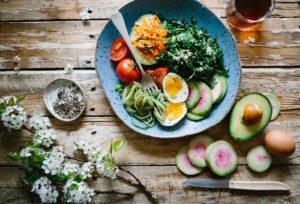 WEHL: If you’re planning to have children after 35, what do you need to know?
WEHL: If you’re planning to have children after 35, what do you need to know?
HJ: As women, we are born with a finite number of follicles present in our ovaries. Female fertility peaks at 25 and declines after age 35. As we age, damage can occur to the mitochondria within these follicles. The mitochondria are considered the energy powerhouse of the cell and this is where the DNA is stored. If the mitochondria are damaged, it will be more difficult to conceive and maintain a pregnancy.
Thankfully, there are ways to protect and repair the mitochondria within these follicles with antioxidants. But, it takes at least 3 months to see changes.
WEHL: What are your top foods for fertility?
HJ: While trying to conceive it is important to eat as many organic, whole foods as possible. If incorporating meat, grass fed animals have higher omega 3s, zinc, and vitamin E.
A diet that is rich in antioxidants (vitamin C, vitamin E, alpha-lipoic acid, selenium), iron, zinc, vitamin B6, vitamin B12, folate, and choline is recommended.
The best foods for fertility include:
- EGGS – a source of protein, choline, vitamin E, vitamin B12, folate, selenium
- ALMONDS – a source of healthy fats, protein, fibre, and the antioxidant vitamin E.
- DARK LEAFY GREENS – a source of fibre, iron, vitamin E, and support healthy estrogen levels
- SUNFLOWER & SESAME SEEDS – a source of healthy fats, fibre, protein, zinc, iron, selenium, vitamin B6, folate and support progesterone levels
- BROCCOLI – a source of fibre, vitamin B6, selenium, folate, vitamin C, alpha-lipoic acid, choline and support healthy estrogen levels
WEHL: Can some foods adversely affect fertility?
HJ: All women have different requirements when it comes to their food choices while trying to conceive. High sugar intake, processed foods and caffeine can negatively impact fertility, hormones, and egg quality.
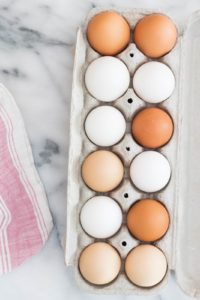 WEHL: Do you have a favourite simple breakfast or lunch recipe you’d like to share that helps to boost fertility?
WEHL: Do you have a favourite simple breakfast or lunch recipe you’d like to share that helps to boost fertility?
HJ: Eggs are probably my favourite food for boosting fertility because of their nutrient profile.
The choline content of eggs especially helps liver metabolism and also prevents insulin resistance and PCOS, which can be a contributing factor to the difficulty in conceiving.
Eggvocado Recipe
2 ingredients · 15 minutes · 1 serving
- 2 eggs
- 1 avocado
Directions
- Preheat oven to 350F (177C).
- Slice the avocado in half and scoop out a little flesh from each half to make room for the eggs. Place face-up on a baking sheet.
- Crack an egg in each half of the avocado and bake for 10 to 15 minutes, depending on how runny you like your eggs. Enjoy!
WEHL: Why are pre-natal vitamins so important and when do you recommend to begin taking one?
HJ: Prenatal vitamins should really be initiated at least 3-6 months before trying to conceive, and preferably a year before! The first 3 months of the pregnancy is when most development occurs, and it’s often not until 6 weeks gestation that most women find out they are pregnant. Although food sources of vitamins and nutrients are the best, we can’t assume we are getting enough from food and that we are absorbing it well.
That being said, the quality of a prenatal vitamin is important! Generally you get what you pay for.
And so, a few notes on prenatals…
Often the recommendation is to make sure that you are getting enough folic acid to prevent spinal tube defects in the fetus. The problem with this recommendation, however, is the following. Grains have been fortified with folic acid since the late 1990s. Folic acid is synthetic (made in a lab), but folate is naturally occurring in food. What we really need is folate not folic acid! And, we have found that many people have issues with something called methylation. If you have a methylation problem, you will have a problem converting synthetic folic acid into usable folate, meaning that folic acid can build up and cause problems. This can become an issue since folate depends on hundreds of biochemical reactions in the body! There has even been some speculation that too much folic acid in the body can cause tongue ties in babies, making breastfeeding difficult. So please, make sure you are taking a prenatal that has folate (5-methyltetrahydrofolate) and not folic acid!
As well, make sure the prenatal minerals are in citrate, bisglycinate, or glycinate forms and not oxide. Oxide forms of minerals are the most poorly absorbed, meaning you won’t get much from your prenatal.
WEHL: Would you recommend a detox before trying to get pregnant? If so, what would that look like?
HJ: Absolutely!
A detox is so necessary for both partners, especially if they are trying to conceive their first child. For females, we actually were already developing in our grandmother’s womb through our mother’s ovaries (crazy, right?) so we really need to look at the environmental burden we are carrying over a few generations’ time. For examples, toxins such as PCBs, phthalates, and arsenic have been shown to contribute to insulin resistance and PCOS.
In my clinical practice, those that do a detox before conception get pregnant quicker than those who do not (both naturally or through IVF). As well, those that detox & optimize their wellness generally have healthier pregnancies and less “pregnancy symptoms” such as morning sickness.
A detox would be designed based on individual needs & history, starting with diet & lifestyle modifications, hydrotherapy and supplements. It’s recommended to start this 3-6 months before trying to conceive.
One easy way to start the detox process is with food. Liver supporting foods such as cruciferous vegetables (broccoli, kale, cauliflower, cabbage, brussel sprouts), onions, garlic, and rosemary can really help balance hormones and aid the liver in detoxifying toxins we may have stored.
WEHL: Is preconception detoxing important for men, too? If so, what would that look like?
HJ: Yes! Similar to females, men also need to detox before trying to conceive.
Research shows that heavy metals, chemicals, and smoking can lower testosterone, as well as damage and lower sperm counts & motility.
Depending on their needs, this would also be diet & lifestyle modifications as well as supplements. Reducing alcohol, eating a balanced diet with good quality protein and colourful vegetables are all ways in which men can optimize their fertility.

WEHL: Other than food, what are some other activities women can do to help increase their fertility?
HJ:
- Reduce stress levels by meditation and mindfulness. Stress management is so crucial for optimal hormone balance. My favourite app is Insight Timer (free on the Apple Store).
- Aerobic exercise + Yoga. Movement helps with hormone balance by ensuring optimal lymphatic and blood flow to the pelvis and reproductive organs.
- Acupuncture. This is one of my favourite modalities that I like to use with women who are trying to conceive! Acupuncture can help correct any organ imbalance related to hormones and reduce stress levels. Research shows that acupuncture can improve conception rates in those undergoing assisted reproduction techniques such as Intrauterine Insemination (IUI) and In-Vitro Fertilization (IVF).
- Herbs! There are so many wonderful herbs that can be used to support fertility, depending on the underlying cause. Best to consult with a Naturopathic Doctor to see which would be a good fit for you.
- Lymphatic massage. An often overlooked cause of infertility is a sluggish lymphatic system!
- Moonbathing! Sounds weird, but being in the light of the full moon (through an evening walk) can actually help regulate periods. It’s been shown that conception rates peak around the full moon!
- Being in the feminine. This one is actually probably the most important. With the fast pace of our lives today, many have lost touch with their inner feminine nature. Similar to the theories of Traditional Chinese Medicine (TCM) of yin and yang, we all need a balance of both masculine & feminine energy. Masculine energy is what most women thrive on today. It’s about doing all the things, achieving goals, logic, order, chaos & high intensity action, versus the Feminine, which is all about being rather than doing, rest, stillness, nature, sensuality, and creativity. So, the best ways of being more in the feminine are creative projects, mindfulness and meditation, yoga, dance, and things that encourage self-expression.
WEHL: We’ve heard about endocrine disruptors having an effect on fertility. What are the most common ones and why should we avoid them?
HJ: Endocrine disruptors definitely impact fertility! Essentially they are toxins found in the environment, which mimic our own hormones, leading to a hormone imbalance in the body. What’s worse is that they can also cause fetal development problems such as lower weight and size, preterm birth, and bone abnormalities.
There are many endocrine disruptors, but this is a short list:
- Heavy metals – Arsenic, Cadmium, Mercury, and Lead are the big ones. Cadmium is found in conventionally grown soybeans and cigarettes. The biggest source of mercury is in silver dental fillings.
- Bisphenol A (BPA) in plastics
- Organophosphate pesticides
- Phthalates in plastics
- Parabens in shampoos, deodorant, creams, sunscreen
- Ammonia in hair dyes and cleaners
- Glyphosate in pesticides
- PCBs in farmed fish, which can specifically lower testosterone in men and lower the thyroid hormones T3 and T4.
WEHL: What are some of your favourite books and/or blogs about fertility and pregnancy?
HJ: Aviva Romm, MD & Midwife has many great books and a blog on all things women’s health! I also love, Taking Charge of Your Fertility by Toni Weschler, and naturopathic blogs by Tori Hudson and Jolene Brighton.
The Environmental Working Group (EWG) and Ecoholic Body by Adria Vasil are great resources to look at in respect to environmental medicine.
And, if you have any kind of spiritual practice, the book Spirit Babies by Walter Makichen is one of my absolute favourite reads.
Connect with Dr. Holly Johnston, BSc, ND:
- Web: www.drhollynd.com,www.sunrisehealthservices.ca
- Email: [email protected]
- Phone: (519) 271-0763
- In-Person: Sunrise Health Services, 413 Hibernia St., Stratford, ON
- Wehl Platform: @drhollynd
We invite you to join our all-in-one healthy lifestyle app at Wehl.com!


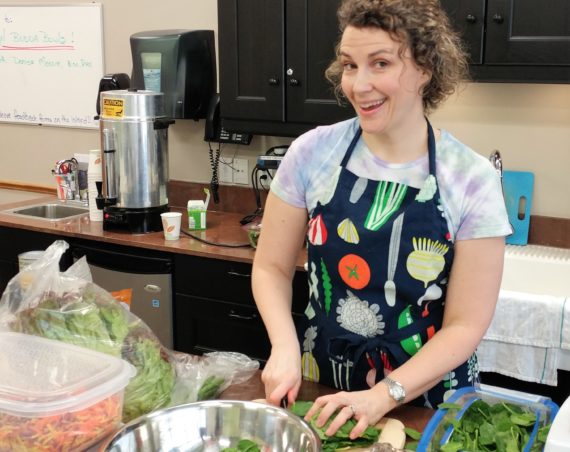
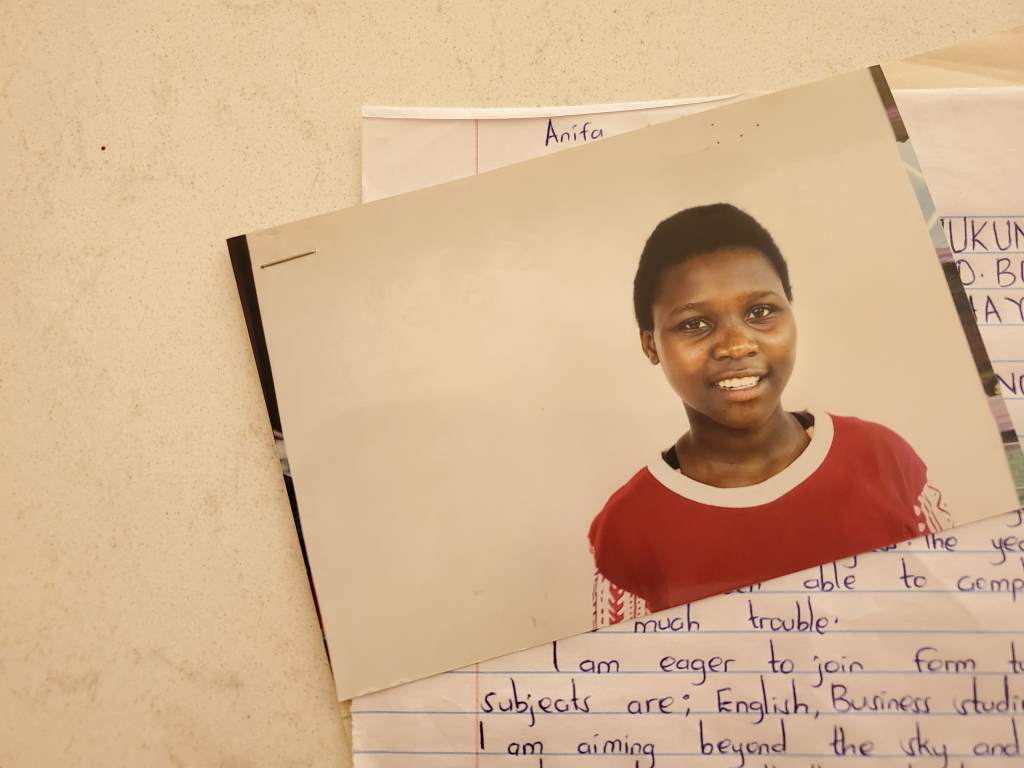
1 Comment
Sherika
This is an informative article. I didn’t know that humans had methylation issues so that was new information for me.